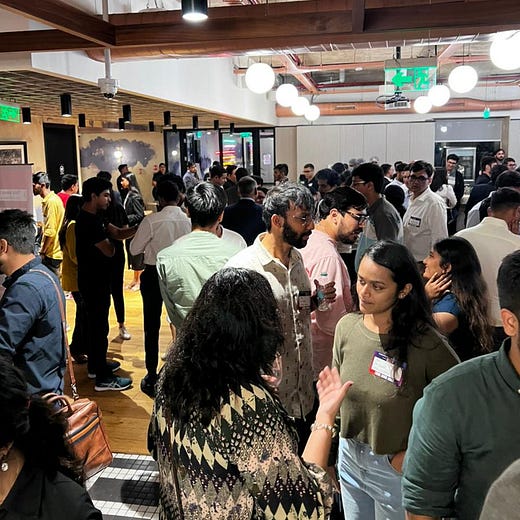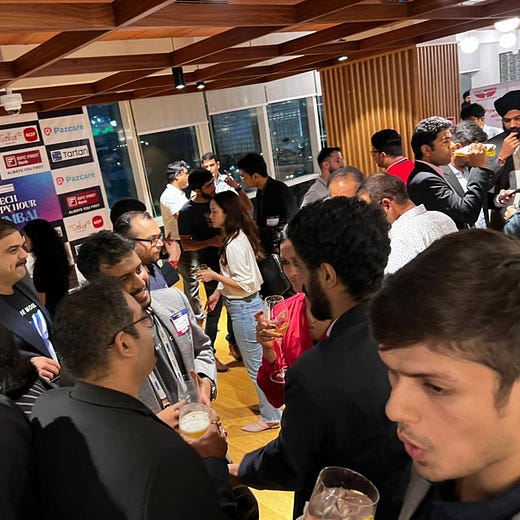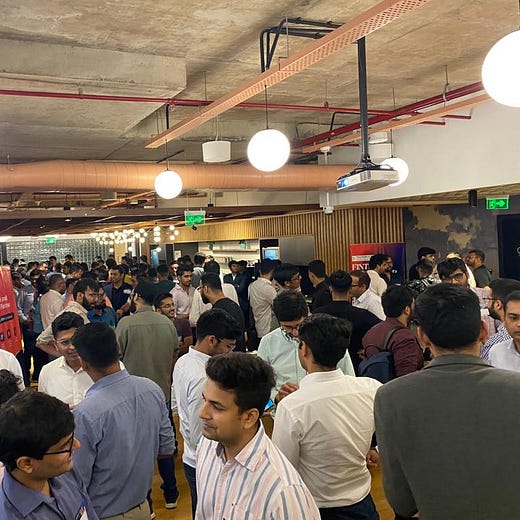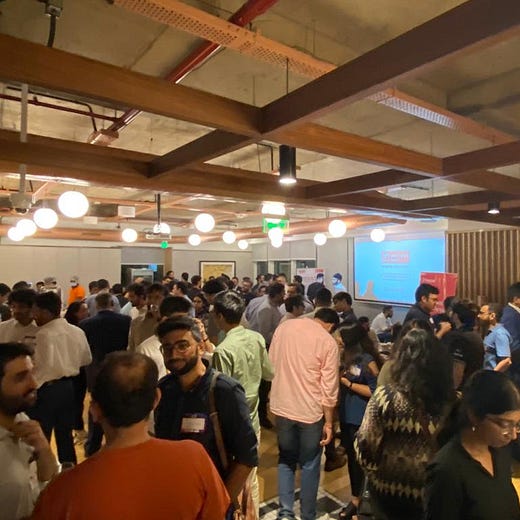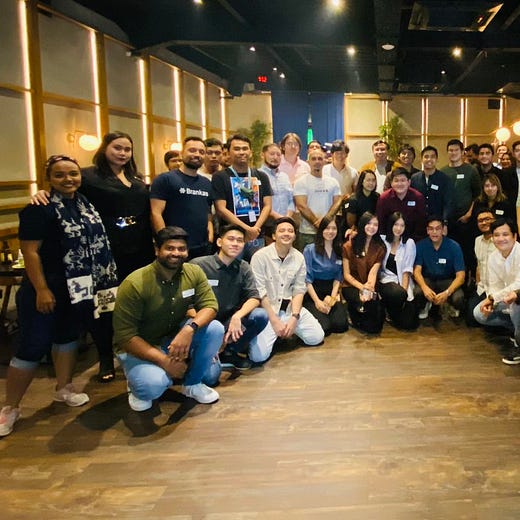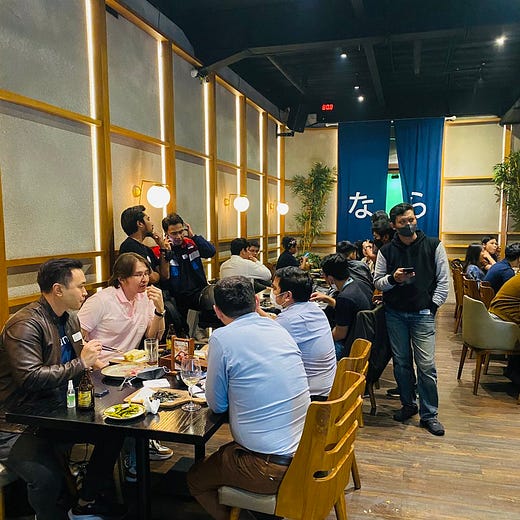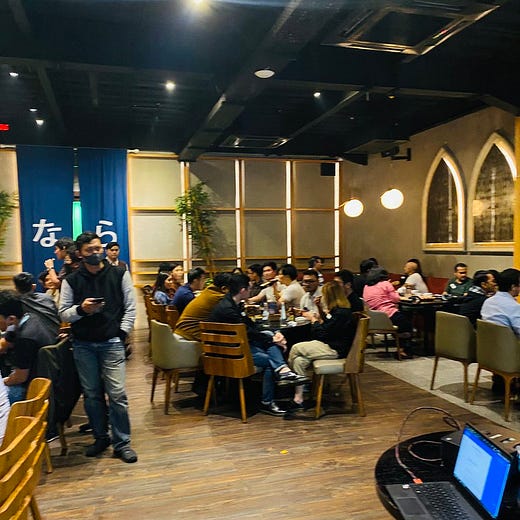Unique Insight | Fintech Inside #68 - 25th Oct, 2022
Founders that study and analyse their users develop unique insights which go on to become large businesses. In today's edition I share a secret to building a large startup (and raising VC funding)
Hi Insiders, I'm Osborne, Principal at Emphasis Ventures (EMVC).
Welcome to the 68th edition of Fintech Inside. Fintech Inside is the front page of Fintech in emerging markets.
Thank you so much for being a subscriber despite my erratic publishing schedule. I must admit, writing has not been easier with travel, work and life (it never has been). Genuinely appreciate all the messages!
This past month has been a bit crazy for me with Global Fintech Fest, Mumbai and Jakarta Fintech Happy Hours organised by me, I then took some time off and later was fortunate to meet the fintech ecosystems in Jakarta and Singapore. Our ecosystems in South and Southeast Asia are so vibrant that I could just land in the two cities and meet so many awesome founders and VC's.
In my nine of years as a VC, I've observed that founders who develop a specific unique insight about their users, go on to build large, successful businesses. Unfortunately, most founders don't think about developing this unique insight. This can be problematic for a founder who has dedicated the next decade of their life and relationships.
In today's edition, I highlight the need for founders to develop a unique insight before starting up. I cover, what is a unique insight, how to develop one and some examples of unique insights of large VC-funded businesses.
Raising funding for your early stage fintech startup? reach out to me connect@osborne.vc
Enjoy another week in fintech!
✨ Fintech Happy Hour in Mumbai and Jakarta
In Sept 2022, I hosted a Fintech Happy Hour for 230+ folks from the Mumbai fintech ecosystem. Thanks to IDFC FIRST Bank, Tartan, Tether by M2P and Pazcare for sponsoring.
And then in Oct 2022, hosted my first Southeast Asian Fintech Happy Hour in Jakarta for 70+ folks from the ecosystem there. Thanks to Mike and Brankas for being excellent hosts and sponsors.
🤔 One Big Thought
Ideas solve problems, unique insights build businesses
Earlier this month (Oct), I traveled to Jakarta and Singapore and was fortunate to spend time with several founders. As a VC, I absolutely love spending time with founders. In my interactions with them, I couldn't help but think that founders in Indo and Singapore were a little "raw" when it came to company building. The ecosystem there still needs to go through some evolution. However, when I returned back home, I started observing my interactions with founders in India. First time founders are raw here as well. The benefit is that the Indian startup ecosystem is large and the founder support system is wide.
I'm merely an observer of founders and startups ecosystems and don't mean to pass any judgements. A person starting up is the single riskiest thing for anyone to do, with implications across stakeholders i.e. family, teams, industries and more. Founders have my highest respect.
Through today's edition of Fintech Inside, I hope to do my part in helping anyone wanting to start up. If you're reading this, by the end of this edition, you should have a decent direction of how to evaluate your conviction in starting up. As a subscriber of Fintech Inside, if there's one thing you take away from my two years of writing this newsletter, it should be this edition.
Another caveat to today's edition: This "unique insight" edition is for anyone wanting to startup. However, IMO, it is even more important if you want to raise VC funding. Don't get me wrong, some really successful businesses can be built without a unique insight, especially if you make it more efficient or better priced for the user. Though, I don't think it will be a venture funded business.
As a VC, every year, I speak to several hundred founders who are raising funding for their big idea. At various stages of my career, I've evaluated startups and founders across stages i.e. idea to Series C/D. Among other things, the one question I find myself consistently asking every founder is this:
"What is a unique insight you've developed that gave you the conviction to start up in this sector?"
The answer to this one question usually gives me a sense of the founders capability and ambition and tilts my decision in their favour or otherwise. In fact, I'd wager that all the founders who built successful businesses did so because they had a very specific, unique insight about their consumer behaviour early on - one that most others ignored.
Isn't this a fairly simple question to answer? This question is deceptively simple to answer. Except, 99% of the time the answer is neither insightful nor unique.
Founders usually respond with some version of their personal motivation behind starting up - which is completely misunderstanding the question. Their response would range from them facing the problem in their daily lives or identifying an inefficiency in the way things worked or just that they believe things should function a certain way. You cannot force-fit a solution that you want to see in the world with a problem that the user is facing. Take this example:
Problem: there are only 35mm unique credit card holders in India. India is a credit-starved country.
Idea: give everyone a credit card.
It's a perfectly reasonable idea to solve the problem of credit under penetration. Unfortunately, this idea is not unique nor insightful and will probably result in a small scale business but not a large successful business.
There's nothing wrong with starting up with those motivations but those are not unique insights - they're common knowledge. As this is common knowledge, anyone starting up with those motivations is building a "me too" business or one that will not scale and therefore will be one with limited outcomes. Again, such business could be good to run in its own right but not one that will be VC-fundable.

The VC model is subject to the power law i.e. few investments will return a majority of fund. By virtue of this law, a VC will optimise for investments that could give them outsized returns. IMO, a startup being founded without a unique insight, is at odds with incentives of the power law for VC's.
What is a Unique Insight? A unique insight is the most elegant distillation of the study of user and market behaviour. A unique insight comes from the keen analysis of user behaviour and incentives, market analysis, first principles thinking, competitor analysis and more. It's an almost perfect tool for a VC to use to identify an exceptional founder.
As Dan Ariely would put it, people are predictably irrational. We're irrational creatures and each of our actions may seem irrational, but if we study the behaviour of a decent-sized sample set of users, behavioural patterns emerge that are predictable. Anyone, wanting to start up, should identify these behavioural patterns to target a solution at.
Founders unfortunately, don't spend enough time on developing a unique insight. The urge to raise funding and launch when we have that delicious idea is palpable - I get it. That's fine. If a founder is starting without the research, they should at least have a guess of their unique insight but be ruthless about speed of execution and iteration. That unique insight can be developed over time but then speed of execution and iteration is a moat.
Why does a unique insight matter? Without fully understanding what drives core human needs and the incentives for people to behave in a certain way, there's no way the user will use a new solution. User behaviour is notoriously difficult to change, even over decades. Markets take their own direction and time. Any founder that puts in the time to study and analyse core human needs will find it easier to build a solution where alternatives fall short.
When a founder responds to the question of unique insight with a user behaviour that they've alone identified - it's like a eureka moment! This eureka moment only comes from spending time with users - observing their interaction with a mock up, asking them questions about their interactions, understanding their problem (not what they say they want as a solution) and many more.
Founders that put in all this work to identify a unique insight are bound to succeed (and I'd want to invest in such founders). The starting point of a product that's developed from a unique insight is already ahead of alternatives and will achieve product-market-fit faster. Most others will be starting from a point of "common knowledge", there's a lot more work to be done from there to find product-market-fit. This is why we see pivots.
It's not uncommon for competitors to copy a product built with a unique insight. That's the thing about technology - it can be easily copied, but one thing that cannot be copied is the drive to seek insights and observe behaviour changes.
The most important thing about developing unique insight is that it cannot be compensated with passion. The founder has to go through the grind and think from first principles to develop this insight. The downside of forcefully making up a unique insight is significant.
What does a good response to this question entail? There's no easy answer to this. My personal gym trainer says that he recognised that people want to look better not to lose/gain weight. He believed this is his unique insight compared to other trainers with the result that he's the only trainer (in the gym I go to) with a consistently booked out roster of clients.
Jimmy from Mr. Beast, in the early days, researched his initial videos and believed that if he got "X" click through rate (CTR) and "Y" Average View Duration (AVD) he'd be able to cross 10mm viewers per video and therefore garner better sponsors. That was his unique insight. He even has a team of 6-7 people dedicated to developing thumbnails for his videos across channels because he saw that thumbnails were driving clicks to his videos.
Stripe's unique insight at the time of starting up was that payment gateways in the US catered to large businesses but every company needs a payment acceptance platform from the early days. Early stage startups don't need the full suite of payments, even a bare bones payment gateway would work. The main insight was that the majority of employees at early stage startups are developers but none of the alternatives were built with developers in mind. That's the unique insight that Stripe started with and if you see any interviews with the founders and you know they're consistent insight seekers.
The founders of Airbnb were determined to make it large because they saw high user demand when they offered their own airbed to attendees of a design convention. Almost everybody "thought" it was a stupid idea.
Gmail's unique insight was that email is a personal database of communications and no one ever wants to delete it, therefore Gmail accounts needed to have "unlimited storage space". The unique insight was not that people needed email accounts - Yahoo was there for that. It was also not that people needed better email - that's vague.
There are many more examples of startups founded because the founders had a specific, simply-worded, unique insight. The weird thing is unique insights, when laid out plainly like above, sound obvious in hindsight. I don't believe unique insights change over time - directionally, it'll always hold true. You just develop new ones and optimise for how user behaviour evolves.
If you're a founder reading this, what is your unique insight that gives you the conviction to startup? I'd love to hear from you about your insight but more importantly your journey of arriving at your insight.
Note: The title "Ideas solve problems, insights build businesses" was first quoted by Dean Mcevoy.
1-min Anonymous Feedback: Your feedback helps me improve this newsletter. Click UPVOTE 👍🏽 or DOWNVOTE 👎🏽
🌏 International
BofA and AmEx reported credit card delinquencies are increasing. Goldman Sach’s Marcus reported $ 110Bn in deposits. Brazil’s Nubank launched a cryptocurrency ‘Nucoin’. Plaid introduced a wallet onboarding tool for crypto.
Looking for the news digest? Read all the week’s fintech news and updates in India and SEA over at This Week in Fintech - India and SEA Edition.
🏷️ Other Notable Nuggets
👋🏾 That's all Folks
If you’ve made it this far - thanks! As always, you can always reach me at connect@osborne.vc. I’d genuinely appreciate any and all feedback. If you liked what you read, please consider sharing or subscribing.
1-min Anonymous Feedback: Your feedback helps me improve this newsletter. Click UPVOTE 👍🏽 or DOWNVOTE 👎🏽
See you in the next edition.



